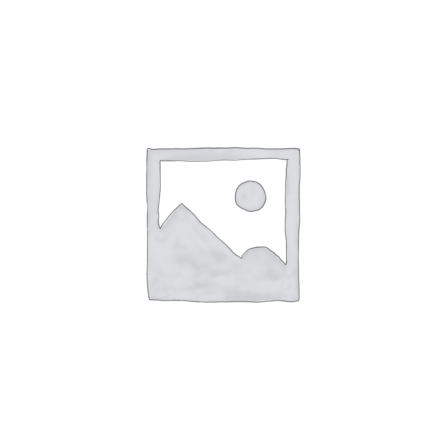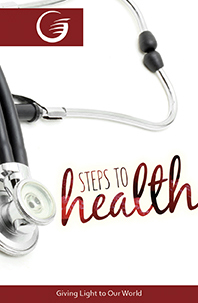
Steps to health
$6.99
Steps to Health
Energy, life, and good health!—if you have them, they are your most valuable possessions. Being healthy means more than just not being sick; it means an abundant life. How can you live life at your full potential—physically, mentally, socially, and spiritually? You can’t control all the things that cause disease or accidents, but you can make choices that reduce your risks and promote health. Here are eight simple steps to better health that you can begin to put into practice today.
Step 1: Exercise
Your body was designed for activity. Being physically fit simply means doing everything you must do each day—with energy left for family and leisure activities.
A simple daily exercise routine will help you achieve this level of physical fitness. Walking is a great way to begin. Start exercising slowly and gradually increase both the time and intensity. You may have heard “no pain, no gain,” but that is not true. Pain can indicate that you are overdoing your workout. Exercise until you are breathing deeply but are not out of breath. Thirty minutes a day is an excellent goal, but since the benefits of exercise are cumulative, even shorter periods, three to five times a week, are helpful.
Can’t find time to exercise? Often in our society a person’s spare time is crowded with many kinds of passive entertainment such as TV, video games, and the Internet. Choosing to turn off the computer, TV, and video games and spend that time in healthful exercise always results in healthful perks! You’ll find that exercise has many benefits—controlling weight, managing stress, boosting your immune system, and reducing the risk of disease. Exercise may add years to your life, but even more importantly, it adds life to your years.
Step 2: Water
Water is essential for life. Many people use thirst as a guide to how much water they should drink, but thirst is the body’s first sign of dehydration. We all lose water each day through urine, feces, sweat, and evaporation from our lungs. So adults need to drink six to eight glasses of water every day—and even more in hot weather or during exercise. Water is vital for kidney function, regulating body temperature, and maintaining body fluids. So drink up! Water is good for you and calorie-free.
Remember: coffee, sodas, and alcohol are not substitutes for water. They are detrimental to your health. In fact studies have shown that caffeine actually depletes your body of more liquid than it provides.
Step 3: Nutrition
The food you eat affects the way you feel and your ability to enjoy life; therefore, making good, nutritious food choices is important. According to the Bible, the original diet consisted of fruits, grains, nuts, and seeds. Interestingly, high-cholesterol animal products were excluded. If Western countries embraced a vegetarian diet, many killer diseases such as hardening of the arteries would fall by the wayside. Study after study shows that God’s plant-based, original diet is superior to any other (see Genesis 1:29-30).
Step 4: Sunshine
You may not think of sunshine as something that affects your health. Yet have you ever noticed how much more easily you tend to become depressed and discouraged during the winter months when days are short and the weather is often cloudy or rainy? Sunlight also helps your body produce vitamin D. This essential nutrient controls body hormones and cell growth, and helps your body absorb and use the calcium needed for strong bones and teeth. Vitamin D also works to develop a healthy immune and nervous system. Too much sunlight, however, can be damaging and cause skin cancers. Avoid prolonged exposure to bright sunlight; wear a hat and use sunscreen.
Step 5: Balance or Moderation
A balanced lifestyle is a healthful lifestyle. Such a lifestyle does not mean “everything in moderation.” Instead, it means carefully including all those good things and habits that promote health while completely avoiding all those things and habits that destroy good health. Balance describes a lifestyle that increases quality of life. For example, overeating leads to stomach upset and/or obesity. Under-eating leads to malnutrition or starvation. Overwork leads to exhaustion or injury. Underwork leads to laziness and muscle weakness. Moderation is a key concept of living a healthy, happy life.
Step 6: Air
Air is obviously crucial; after all, we can live only a few minutes without breathing. But the quality of the air we breathe is also important. Air pollution can cause illness and death if pollutants become concentrated for several days or weeks—especially for the very young and the very old or for those suffering from congestive heart failure or chronic lung diseases. Probably the most damaging air pollution comes from smoking. The harmful effects of smoking have become so well documented that there is no longer any question that smoking kills. To help maintain good health, breathe deeply of pure, clean air.
Step 7: Rest
Studies continue to show that adults need eight hours of good sleep per night to really function effectively. We may tell ourselves that we can get by on less, but sleep deprivation is a serious problem in today’s fast-paced society. Besides getting enough sleep, you need to include recreation in your life. Getting away for a day in nature, a walk in the mountains or along a beach, can refresh you and help you cope better with stress. God recognized our need for rest and relaxation by giving us a weekly day of rest—the seventh-day Sabbath (see Exodus 20:8–11).
Step 8: Trust In God
The spiritual dimension of health is even more important to your total wellbeing than are the physical factors. Stress, worry, and guilt nibble away at your life force and can cause illness. Trusting in God, your Creator, gives your life a sense of purpose that can help you overcome the negative effects of stress, worry, and guilt. You can increase your trust in God by reading His word, the Bible, on a daily basis (see Romans 10:17). For an easy way to learn more about God and the Bible, look for the free offer on the back panel. God says, “Those who hope in the Lord will renew their strength. They . . . will run and not grow weary, they will walk and not be faint” (Isaiah 40:31). Trust in God is a vital aspect of good health.
Conclusion
To help you experience the life He desires for you, God has given these simple, easy-to-follow steps to better health. The Bible calls this the “abundant” life (see John 10:10), and it is exactly what God wants you to have. He says, “I pray that you may enjoy good health and that all may go well with you” (3 John 2).
These eight easy steps to better health may seem simple, but they are powerful. Begin to put them into practice in your life today—and see the difference!
Scripture taken from THE HOLY BIBLE, NEW INTERNATIONAL VERSION®, NIV® Copyright © 1973, 1978, 1984, 2011 by Biblica, Inc.® Used by permission. All rights reserved worldwide.
Cover image: ©www.photodune.net
11 in stock
Steps to Health
Energy, life, and good health!—if you have them, they are your most valuable possessions. Being healthy means more than just not being sick; it means an abundant life. How can you live life at your full potential—physically, mentally, socially, and spiritually? You can’t control all the things that cause disease or accidents, but you can make choices that reduce your risks and promote health. Here are eight simple steps to better health that you can begin to put into practice today.
Step 1: Exercise
Your body was designed for activity. Being physically fit simply means doing everything you must do each day—with energy left for family and leisure activities.
A simple daily exercise routine will help you achieve this level of physical fitness. Walking is a great way to begin. Start exercising slowly and gradually increase both the time and intensity. You may have heard “no pain, no gain,” but that is not true. Pain can indicate that you are overdoing your workout. Exercise until you are breathing deeply but are not out of breath. Thirty minutes a day is an excellent goal, but since the benefits of exercise are cumulative, even shorter periods, three to five times a week, are helpful.
Can’t find time to exercise? Often in our society a person’s spare time is crowded with many kinds of passive entertainment such as TV, video games, and the Internet. Choosing to turn off the computer, TV, and video games and spend that time in healthful exercise always results in healthful perks! You’ll find that exercise has many benefits—controlling weight, managing stress, boosting your immune system, and reducing the risk of disease. Exercise may add years to your life, but even more importantly, it adds life to your years.
Step 2: Water
Water is essential for life. Many people use thirst as a guide to how much water they should drink, but thirst is the body’s first sign of dehydration. We all lose water each day through urine, feces, sweat, and evaporation from our lungs. So adults need to drink six to eight glasses of water every day—and even more in hot weather or during exercise. Water is vital for kidney function, regulating body temperature, and maintaining body fluids. So drink up! Water is good for you and calorie-free.
Remember: coffee, sodas, and alcohol are not substitutes for water. They are detrimental to your health. In fact studies have shown that caffeine actually depletes your body of more liquid than it provides.
Step 3: Nutrition
The food you eat affects the way you feel and your ability to enjoy life; therefore, making good, nutritious food choices is important. According to the Bible, the original diet consisted of fruits, grains, nuts, and seeds. Interestingly, high-cholesterol animal products were excluded. If Western countries embraced a vegetarian diet, many killer diseases such as hardening of the arteries would fall by the wayside. Study after study shows that God’s plant-based, original diet is superior to any other (see Genesis 1:29-30).
Step 4: Sunshine
You may not think of sunshine as something that affects your health. Yet have you ever noticed how much more easily you tend to become depressed and discouraged during the winter months when days are short and the weather is often cloudy or rainy? Sunlight also helps your body produce vitamin D. This essential nutrient controls body hormones and cell growth, and helps your body absorb and use the calcium needed for strong bones and teeth. Vitamin D also works to develop a healthy immune and nervous system. Too much sunlight, however, can be damaging and cause skin cancers. Avoid prolonged exposure to bright sunlight; wear a hat and use sunscreen.
Step 5: Balance or Moderation
A balanced lifestyle is a healthful lifestyle. Such a lifestyle does not mean “everything in moderation.” Instead, it means carefully including all those good things and habits that promote health while completely avoiding all those things and habits that destroy good health. Balance describes a lifestyle that increases quality of life. For example, overeating leads to stomach upset and/or obesity. Under-eating leads to malnutrition or starvation. Overwork leads to exhaustion or injury. Underwork leads to laziness and muscle weakness. Moderation is a key concept of living a healthy, happy life.
Step 6: Air
Air is obviously crucial; after all, we can live only a few minutes without breathing. But the quality of the air we breathe is also important. Air pollution can cause illness and death if pollutants become concentrated for several days or weeks—especially for the very young and the very old or for those suffering from congestive heart failure or chronic lung diseases. Probably the most damaging air pollution comes from smoking. The harmful effects of smoking have become so well documented that there is no longer any question that smoking kills. To help maintain good health, breathe deeply of pure, clean air.
Step 7: Rest
Studies continue to show that adults need eight hours of good sleep per night to really function effectively. We may tell ourselves that we can get by on less, but sleep deprivation is a serious problem in today’s fast-paced society. Besides getting enough sleep, you need to include recreation in your life. Getting away for a day in nature, a walk in the mountains or along a beach, can refresh you and help you cope better with stress. God recognized our need for rest and relaxation by giving us a weekly day of rest—the seventh-day Sabbath (see Exodus 20:8–11).
Step 8: Trust In God
The spiritual dimension of health is even more important to your total wellbeing than are the physical factors. Stress, worry, and guilt nibble away at your life force and can cause illness. Trusting in God, your Creator, gives your life a sense of purpose that can help you overcome the negative effects of stress, worry, and guilt. You can increase your trust in God by reading His word, the Bible, on a daily basis (see Romans 10:17). For an easy way to learn more about God and the Bible, look for the free offer on the back panel. God says, “Those who hope in the Lord will renew their strength. They . . . will run and not grow weary, they will walk and not be faint” (Isaiah 40:31). Trust in God is a vital aspect of good health.
Conclusion
To help you experience the life He desires for you, God has given these simple, easy-to-follow steps to better health. The Bible calls this the “abundant” life (see John 10:10), and it is exactly what God wants you to have. He says, “I pray that you may enjoy good health and that all may go well with you” (3 John 2).
These eight easy steps to better health may seem simple, but they are powerful. Begin to put them into practice in your life today—and see the difference!
Scripture taken from THE HOLY BIBLE, NEW INTERNATIONAL VERSION®, NIV® Copyright © 1973, 1978, 1984, 2011 by Biblica, Inc.® Used by permission. All rights reserved worldwide.
Cover image: ©www.photodune.net
Each package contains 100 tracts.
Dimensions: 4.25 x 2.75 x 1.5 inches

